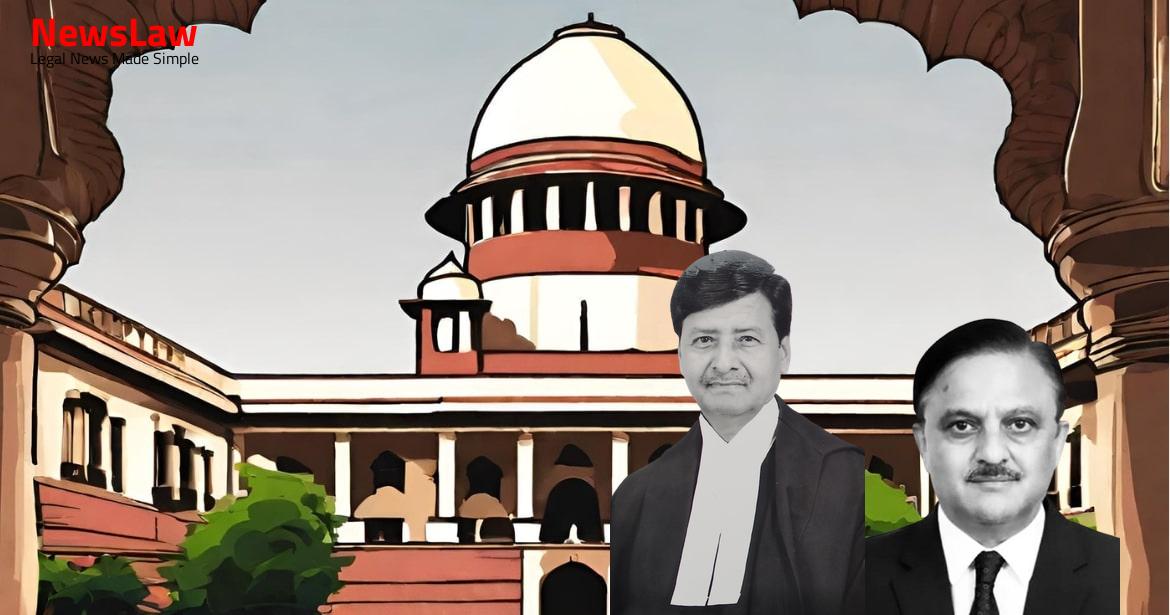In a recent legal case, the court delved into the crucial analysis of jurisdiction and powers of a Facilitation Council in the realm of the Arbitration Act. The case highlighted the significance of understanding the legal intricacies surrounding the role of the council in resolving disputes. Let’s delve deeper into the court’s interpretation and analysis of these critical aspects.
Facts
- The appeal is filed against the judgment and order dated 12.03.2012 by the High Court of Chhattisgarh at Bilaspur
- The High Court dismissed the writ petition as not maintainable due to remedy available under Section 34 of the Arbitration and Conciliation Act, 1996
- Original respondent No.1 has filed the present civil appeal feeling aggrieved with the High Court’s decision
- Facilitation Council closed the proceedings stating its limited object and jurisdiction.
- The Facilitation Council cannot conduct a thorough inquiry or decide on the truth of challenged documents.
- Parties are advised to approach the competent court for further proceedings.
- The respondent filed a writ petition before the High Court of Chhattisgarh challenging the Facilitation Council’s order.
- The High Court dismissed the writ petition stating that the order can be considered an award under Section 18 of the MSMED Act.
- The High Court mentioned that the provisions of the Arbitration Act would apply to the dispute and an appeal under Section 34 of the Arbitration Act could be made before the district court.
- The High Court based its dismissal on the availability of an alternate remedy through the Arbitration Act.
- The respondent, dissatisfied with the High Court’s order, filed the present appeal challenging the basis of the dismissal.
- A dispute arose between the parties regarding the remaining payment for supplied TMT bars.
- The respondent claimed to have supplied TMT bars worth Rs. 2,44,92,846 to the appellant but had only received Rs. 1,24,50,000.
- The appellant’s non-payment led the respondent to approach the Chairman for resolution.
Also Read: Court’s Jurisdiction in Re-appraising Arbitrator’s Findings
Arguments
- Learned counsel for the appellant argues that the order of the Facilitation Council under challenge cannot be termed as an award.
- The Facilitation Council did not conclusively settle the dispute but rejected the application citing lack of jurisdiction.
- Facilitation Council stated that they did not have the authority to conduct a thorough inquiry, take evidence, and determine the authenticity of the contested document.
- As the order was not considered an award, it was not subject to appeal under Section 34 of the Arbitration Act.
- Learned counsel representing the respondent argues that the order of rejection by the Facilitation Council can be considered an ‘award’ and thus can be challenged under Section 34 of the Arbitration Act.
- Heavy reliance is placed on Section 27 of the Arbitration Act to support this argument.
- It is contended that the Facilitation Council possesses all the jurisdiction granted to an arbitrator under the Arbitration Act, including the authority to take evidence.
- The respondent disputes the Facilitation Council’s assertion that it lacks the jurisdiction to conduct a thorough inquiry and gather evidence, emphasizing that the Council has been vested with comprehensive powers and is not limited in its scope or authority.
Also Read: Contrary Directions in Issuance of Letter of Intent
Analysis
- The Facilitation Council has a dual role as a Conciliator and an Arbitrator under the MSMED Act.
- The matter needs to be remitted to the Facilitation Council to follow the procedure under Section 18 of the MSMED Act.
- The observations of the Facilitation Council regarding limitations on jurisdiction are not accepted.
- The MSMED Act has overriding effect over other laws, including the Arbitration Act.
- Disputes under the MSMED Act are required to be resolved through the procedure in Section 18.
- The Facilitation Council must act as per the procedure in the MSMED Act before arbitration can commence.
- The role of the conciliator is to assist parties in reaching a settlement before arbitration proceedings begin.
- Evidence is not required during the conciliation stage, but arbitration proceedings must be initiated if no settlement is reached.
- If conciliation fails, arbitration proceedings must follow as per Sub-Section (3) of Section 18 of the MSMED Act.
- The order of the Facilitation Council dated 10.01.2012 needs to be reviewed in light of the statutory provisions.
- The conciliator may conduct the conciliation proceedings in a manner he deems appropriate, considering the circumstances of the case and the parties’ wishes.
- The settlement agreement carries the same status and effect as an arbitral award on agreed terms.
- The conciliator is to assist parties impartially and independently in reaching a settlement.
- Costs of conciliation to be communicated to parties; unexpended balances to be returned.
- The conciliator is not to act as an arbitrator or representative in any subsequent proceedings.
- Evidence from conciliation proceedings is not admissible in later arbitration or judicial proceedings.
- Parties may suggest settlement ideas; a written settlement agreement is binding when signed by parties.
- Parties to cooperate in good faith with the conciliator’s requests for information and evidence.
- The conciliator has a time limit of ninety days to decide on a reference.
- The conciliation proceedings can be terminated by various means, including signing a settlement agreement or written declaration of termination.
- Parties should not initiate arbitral or judicial proceedings during conciliation, unless necessary to preserve rights.
- Costs of the conciliation proceedings are to be borne equally by the parties unless specified otherwise.
- The conciliator may propose a settlement at any stage and must authenticate the settlement agreement.
- The Micro and Small Enterprises Facilitation Council or an ADR center has jurisdiction over disputes between supplier and buyer.
- Parties are required to follow the procedure as prescribed under Section 18 of the MSMED Act for resolving disputes.
- Interest is payable by the buyer if payment to the supplier is delayed, as per the provisions of the Act.
- The conciliator must keep all matters relating to the proceedings confidential.
- Communication between the conciliator and parties can be oral or written as required.
- The role of the Facilitation Council as a Conciliator is to assist parties in reaching an amicable settlement independently and impartially.
- At the conciliation stage, the Council is not required to adjudicate the dispute and does not have jurisdiction to make thorough enquiries or take evidence.
- If conciliation fails and arbitration proceedings start, the Council as an arbitrator will have all the powers of an arbitrator under the Arbitration Act.
- The Facilitation Council’s statement that it has no jurisdiction to make thorough enquiries and take evidence is not correct.
Also Read: Application for Stay in Civil Suit Rejected: Court’s Legal Analysis
Decision
- The order passed by the Micro Small and Medium Enterprises Facilitation Council, Chhattisgarh, Raipur dated 10.01.2012 in case No. 26/MSTFC/2009 is quashed and set aside.
- The impugned judgment and order passed by the High Court in writ petition (c) No. 418 of 2012 are also quashed and set aside.
- The matter is remitted to the Micro Small and Medium Enterprises Facilitation Council, Chhattisgarh, Raipur for a fresh decision on case No. 26/MSTFC/2009 in accordance with the law and on its own merits.
- The Council is instructed to follow the procedure as required under Section 18 of the MSMED Act and as per the observations mentioned in the judgment.
Case Title: M/S VIJETA CONSTRUCTION Vs. M/S. INDUS SMELETERS LTD (2021 INSC 530)
Case Number: C.A. No.-005934-005934 / 2021



